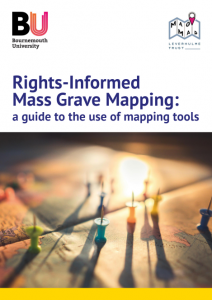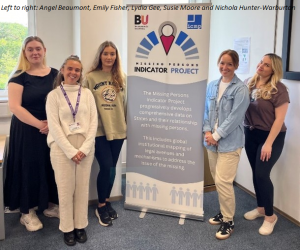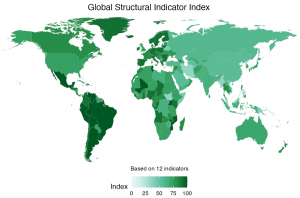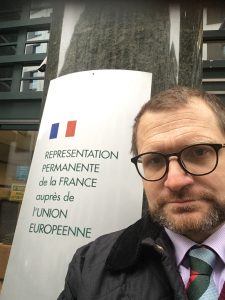As the new academic year begins, so does the recruitment process for a new cohort of Missing Persons Indicator Project researchers. This year, as well as recruiting law students to the project, we are presenting this opportunity to budding researchers across the university. Notably, a new collaboration between the FMC and BUBS has emerged, enhancing the interdisciplinary approach of the project.
In collaboration with the International Commission on Missing Persons, students have begun the process of collating indicators to capture the way States engage with, and seek to solve, missing persons cases. These indicators range from understanding contextual factors that could have contributed to a surge of missing persons cases, such as conflict or natural disasters, to international treaty ratification, to domestic legislation.
In light of recent headlines concerning conflicts across the globe, students have likely been exposed to stories that highlight the pressing issues of our time, such as missing persons. This voluntary research project offers them a unique opportunity to engage with work that has real-world significance, showing how research can extend beyond the university to make a meaningful impact.
Our expectations:
- Dedicate approximately 8 hours a month to the project (flexible around university commitments).
- Attend in-person meetings, skills workshops and data collating sessions.
- Be keen to develop research skills.
- Work respectfully within a diverse team.
Student experience:
- Support into real-world research with lasting impact.
- Assist in articulating the project into written form to enhance employability.
- Optional research skills workshops.
- Inter-disciplinary learning.
- Feedback opportunities.
- A well-stocked snack cupboard.
If you feel this opportunity would benefit students in your faculty, discipline, or program, please email indicators@bournemouth.ac.uk to request the necessary recruitment paperwork or to arrange a drop-in talk for your students.



 A team of 10 LLB Law students from across all levels is collating data on a pro bono basis on international, knowledge exchange project.
A team of 10 LLB Law students from across all levels is collating data on a pro bono basis on international, knowledge exchange project. Findings to date will form part of the forthcoming ICMP Global Report and we will present the project rationale, methodology, data analysis and visualisation at the online
Findings to date will form part of the forthcoming ICMP Global Report and we will present the project rationale, methodology, data analysis and visualisation at the online 













 Dr. Ashraf cited on ‘Modest Fashion’ in The Guardian
Dr. Ashraf cited on ‘Modest Fashion’ in The Guardian NIHR-funded research launches website
NIHR-funded research launches website Academics write for newspaper in Nepal
Academics write for newspaper in Nepal New paper published on disability in women & girls
New paper published on disability in women & girls Global Consortium for Public Health Research 2025
Global Consortium for Public Health Research 2025 MSCA Postdoctoral Fellowships 2025 Call
MSCA Postdoctoral Fellowships 2025 Call ERC Advanced Grant 2025 Webinar
ERC Advanced Grant 2025 Webinar Horizon Europe Work Programme 2025 Published
Horizon Europe Work Programme 2025 Published Horizon Europe 2025 Work Programme pre-Published
Horizon Europe 2025 Work Programme pre-Published Update on UKRO services
Update on UKRO services European research project exploring use of ‘virtual twins’ to better manage metabolic associated fatty liver disease
European research project exploring use of ‘virtual twins’ to better manage metabolic associated fatty liver disease